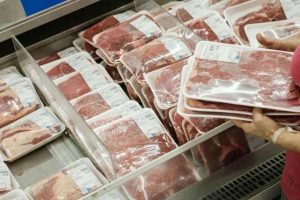MEAT imports rose 3.78% year on year in the five months to May, driven by higher shipments of chicken, buffalo meat, lamb, and duck, according to the Bureau of Animal Industry (BAI).
The BAI said import volume amounted to 478 million kilograms of meat and meat products in the first five months.
Chicken imports, which accounted for 36% of meat imports overall, totaled 172.62 million kilos, up 32.25% from a year earlier.
Some 55.18% or 95.26 million kilos came in the form of mechanically deboned meat (MDM). Chicken MDM imports rose 293.89% during the period.
Brazil supplied 99.57 million kilos of chicken, followed by the US (58.20 million) and Canada (6.68 million).
The Department of Agriculture recently lifted a ban on poultry products from the Netherlands and the US state of Minnesota after these locations were declared free of H5N1 Highly Pathogenic Avian Influenza.
Buffalo meat imports rose 41.56% year on year to 22.67 million kilos, while lamb imports rose 39.15% to 384,417 kilos. Duck imports rose 581.42% to 139,753 kilos.
Lower import volumes were recorded for pork, beef, and turkey.
Pork imports — mostly offal and pork cuts — fell 8.66% year on year to 229.20 million kilos. This is equivalent to 47.92% of all meat imports.
Spain was the primary source of pork with 66.65 million kilos, followed by Canada (36.60 million kilos) and Brazil (31.26 million kilos).
Imported beef and turkey meat also dropped 15.38% to 53.21 million kilos and 64.23% to 89,889 kilos, respectively.
Brazil supplied 148.61 million kilos of meat, followed by the US (78.52 million), Spain (67.22 million), and Canada (43.72 million).
Last month, the Meat Importers and Traders Association asked the government to impose a 5% tariff across the board on all meat and edible offal imports for the next five years.
The group proposed the 5% tariff as the executive order (EO) setting the current tariff rates for imported pork is set to expire by the end of 2023, at which time they would revert to 30% for shipments within the minimum access volume (MAV) quota and 40% for shipments in excess of the quota.
At present, the pork tariff is set at 15% for MAV shipments and 25% for those in excess of the MAV, following EOs issued by presidents Rodrigo R. Duterte and Ferdinand R. Marcos, Jr. — Sheldeen Joy Talavera

